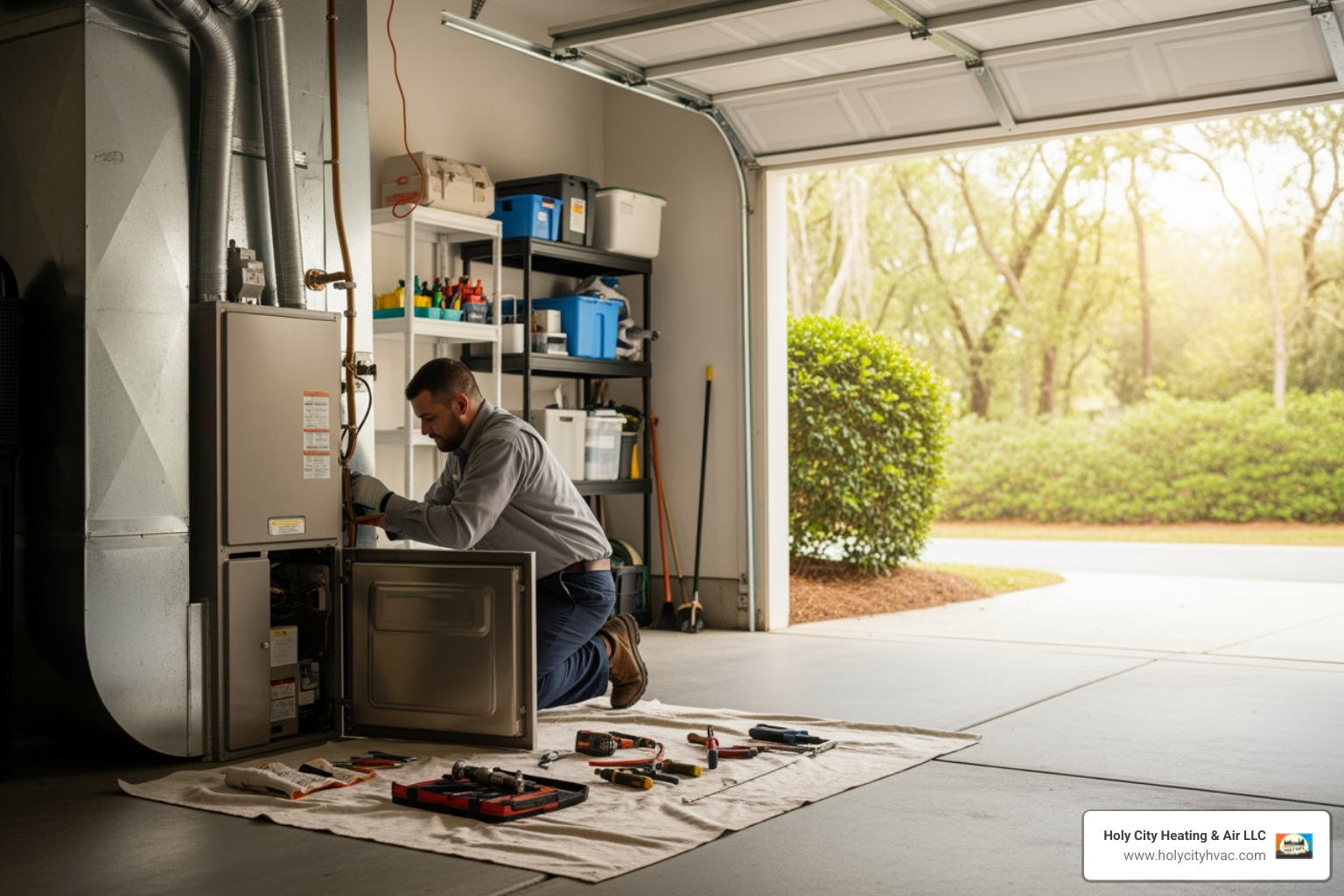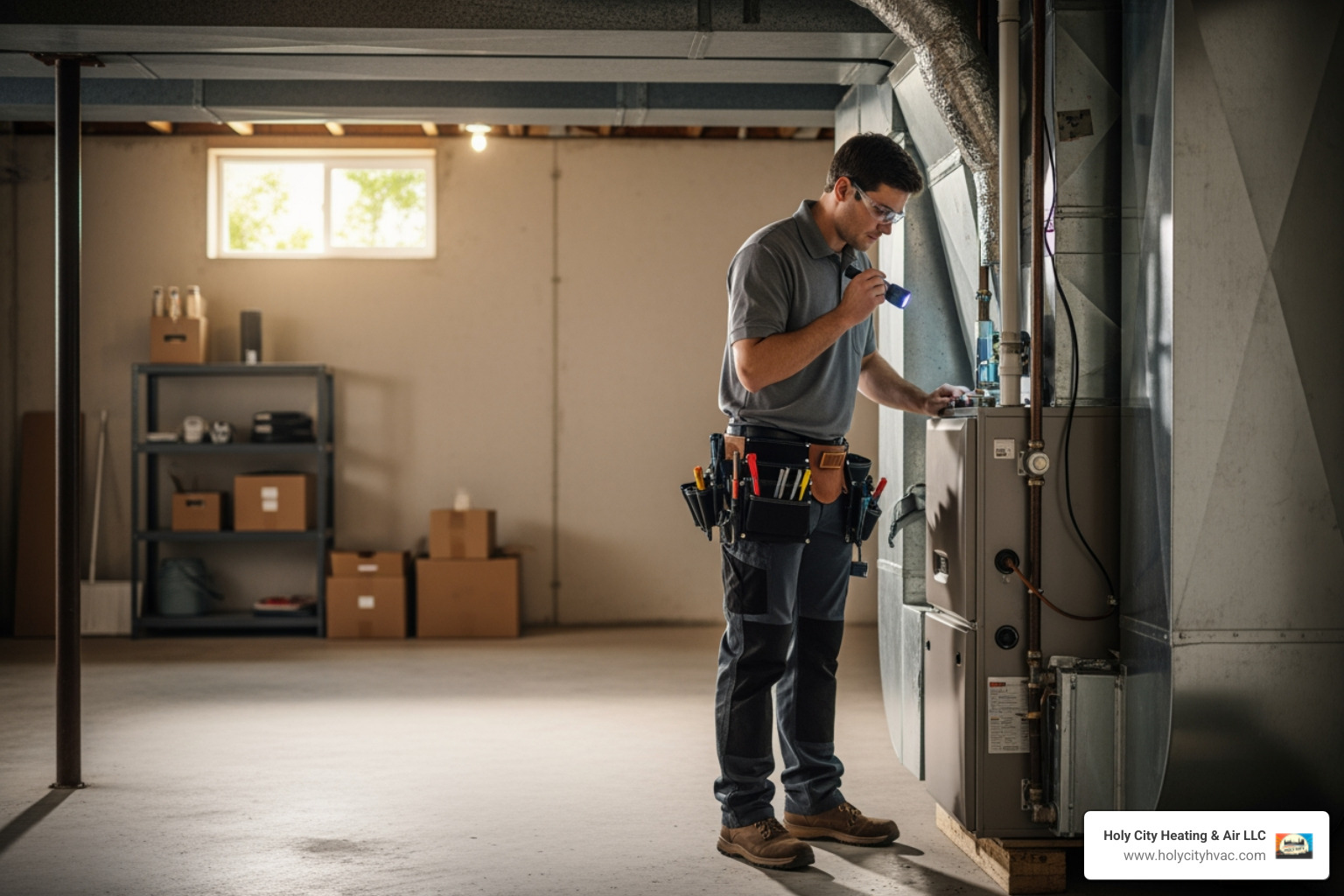
Your Guide to Water Heater Woes
Common water heater repairs are a reality for every homeowner. An ice-cold shower or a puddle around the unit signals a disruptive home emergency. Understanding the most frequent problems helps you know when to attempt a simple fix and when to call a professional.
Here are the most frequent water heater problems:
- No hot water: Often caused by tripped breakers, failed heating elements, or pilot light issues.
- Leaks: Usually from loose valves, tank corrosion, or worn anode rods.
- Strange noises: Popping and rumbling typically indicate sediment buildup.
- Discolored or smelly water: Rusty water or rotten egg odors signal internal corrosion or bacteria.
- Temperature problems: Water that's too hot or not hot enough points to thermostat or capacity issues.
Water heaters last about 8-12 years, but proper maintenance can prevent many issues. The U.S. Department of Energy recommends a 120°F setting for safety and efficiency. While some fixes like adjusting a thermostat are simple, issues involving gas lines or major leaks require immediate professional help.
As one experienced plumber noted: "I can't stress enough how important it is to keep up with water heater maintenance. I've carried out water heaters that weighed twice as much as they should due to build-up."
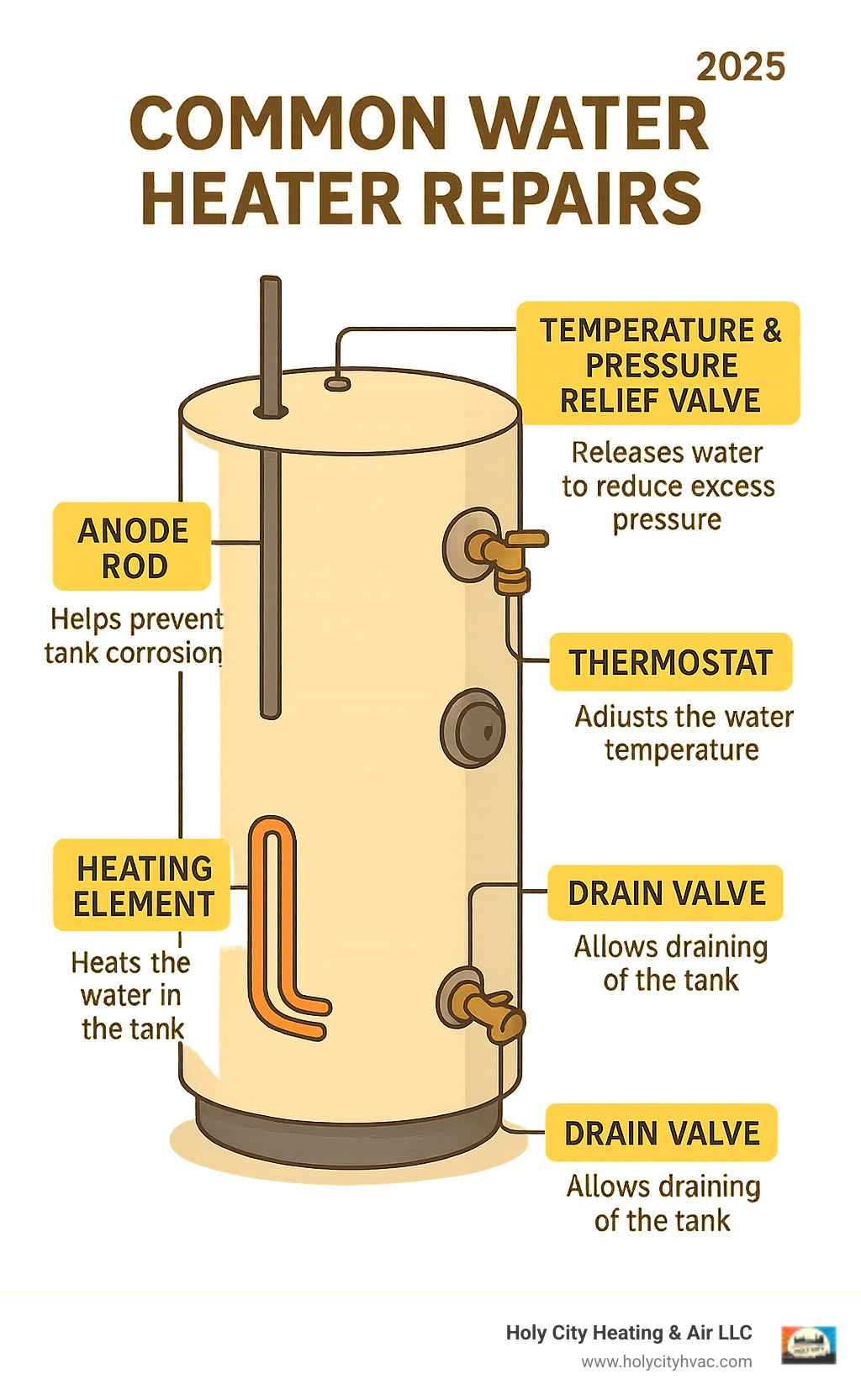
Safety First: Before You Troubleshoot
Before attempting any common water heater repairs, your safety is the top priority. These appliances combine electricity or gas with high-pressure water, demanding caution.
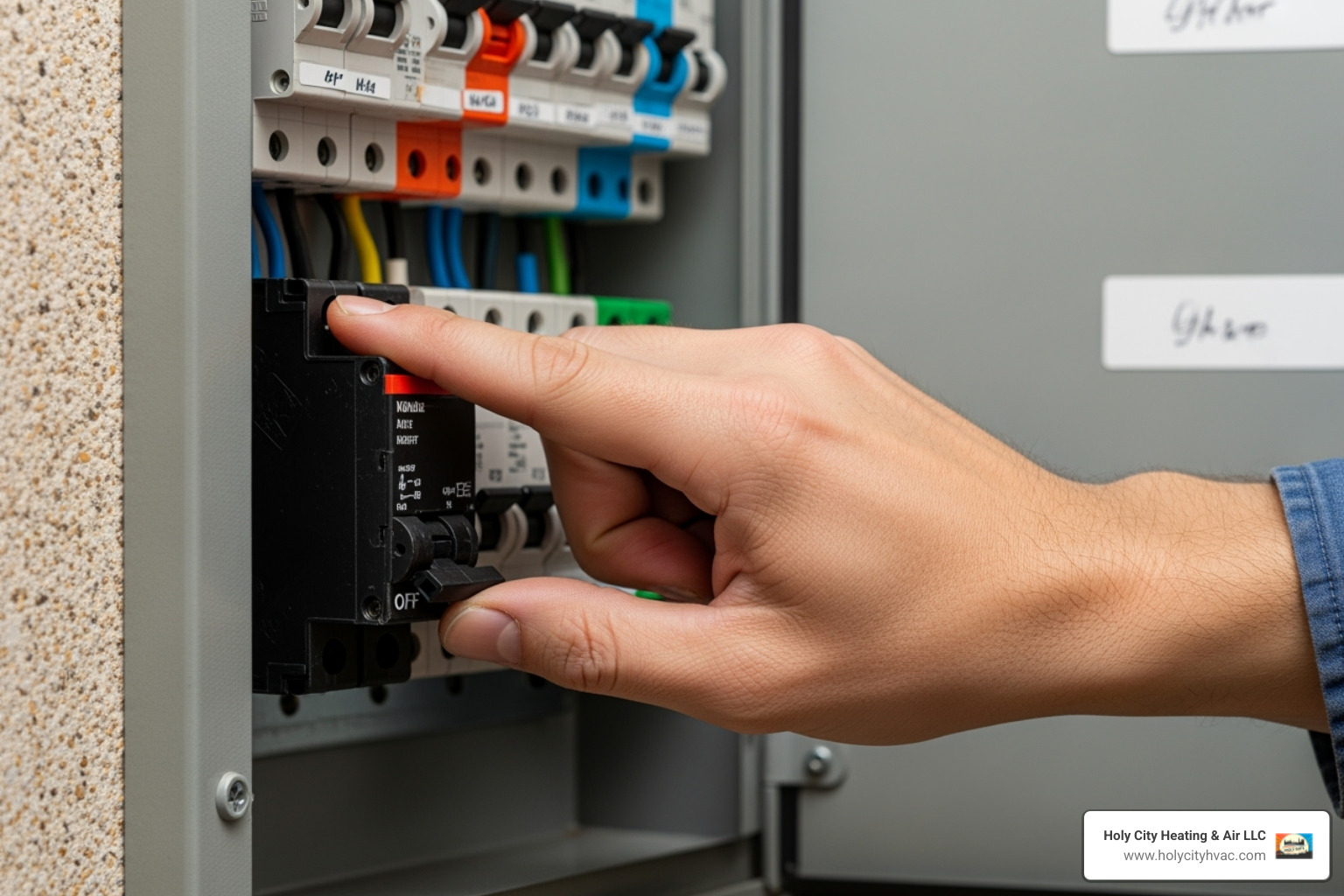
Always turn off the power or gas supply before touching anything. For electric heaters, flip the dedicated circuit breaker. For gas units, turn the gas valve to 'OFF'. This is a critical first step to prevent shock or burns.
For electric models, use a voltage tester to confirm the power is off before you begin work. This inexpensive tool provides essential peace of mind.
Gas water heaters have additional risks. If you smell gas (a rotten egg odor), do not investigate. Evacuate your home immediately and call the gas company or emergency services from a safe distance. Gas leaks can cause fires, explosions, or carbon monoxide buildup.
To prevent water damage during your repair, know where your main water shut-off valve is and be ready to use it.
Calling a professional isn't admitting defeat; it's a smart choice. Complex electrical work, gas line issues, and major leaks should be handled by licensed professionals. At Holy City Heating & Air, we've seen DIY attempts turn minor issues into major headaches. Sometimes, the smartest decision is to let an expert handle it safely from the start.
Diagnosing the Top 5 Common Water Heater Repairs
A cold shower or a puddle near your water heater are clear signals that something needs attention. Let's diagnose the five most frequent issues.
No Hot Water: The Most Frequent of Common Water Heater Repairs
An ice-cold shower is a clear sign your water heater has a problem.

For electric units, check for power issues first. Reset the circuit breaker. Also, check the high-temperature limit switch (a red reset button) near the upper thermostat, but only after turning off the power. If power isn't the issue, you may have failed heating elements. Units have upper and lower elements; if one fails, you'll get lukewarm water, but if both fail, the water will be cold.
For gas heaters, a common issue is an extinguished pilot light; relighting instructions are usually on the unit. If it won't stay lit, the thermocouple may need replacing. Also, ensure the gas valve is fully open.
A faulty thermostat on any unit can fail to call for heat, leaving you with cold water.
For detailed troubleshooting steps, check out Why isn't my water heater heating my water?. If you're dealing with no hot water in our service area, we're here to help: More info about Water Heater Repair Services.
Leaking Water Heater: A Critical Issue in Common Water Heater Repairs
A leaking water heater needs immediate attention to prevent water damage. The first step is to identify the source of the leak.
- Loose connections: Check for loose connections at the drain valve (bottom) and inlet/outlet pipes (top). Tightening these is often a simple fix.
- T&P valve: A dripping temperature and pressure (T&P) valve may be faulty. However, it could also indicate excessive system pressure, which is a more serious issue.
- Anode rod failure: A failed anode rod leads to tank corrosion. This rod protects the tank's lining, and once it's gone, the tank itself will rust and leak.
- Tank corrosion: The worst-case scenario is a corroded tank, often indicated by water at the base or rust streaks. This usually requires a full replacement, especially in units over 10 years old.
Even small leaks can cause significant damage, mold, and structural problems. A ruptured tank can flood your home.
For more guidance, see Do You Need to Replace Your Water Heater If It's Leaking? - P&L Plumbing. If you notice any signs of leaking, don't wait to get help: More info about Signs You Need Water Heater Repair.
Strange Noises: Popping, Rumbling, and Whining
Popping or rumbling sounds from your water heater are warning signs that shouldn't be ignored.
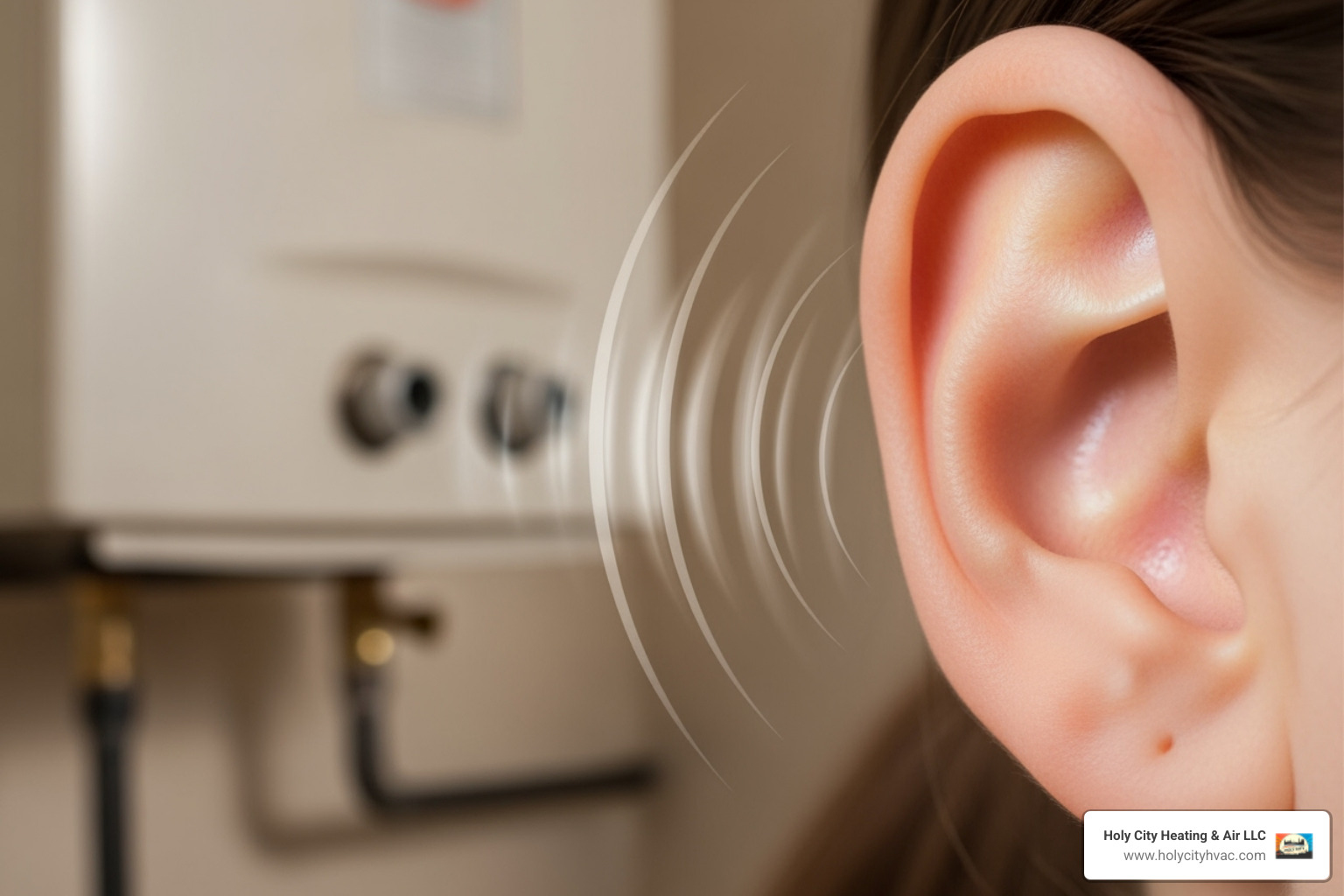
Sediment buildup is the primary cause. Minerals settle at the tank's bottom, trapping water underneath. As the water heats, it bubbles up through the sediment, causing popping sounds. This sediment layer insulates the water from the heat source, reducing efficiency and shortening the unit's lifespan. A high-pitched whine can indicate mineral deposits on heating elements or a faulty pressure relief valve.
The solution is usually flushing the tank to remove sediment. This annual task restores quiet, efficient operation. You can find tutorials online, like this video for tips about how to do this. If flushing doesn't help, or if you're uncomfortable with the task, contact a professional.
Discolored or Smelly Water
Rusty or smelly hot water is a clear sign of a problem inside your water heater.
- Rusty water: If only your hot water is rusty, the cause is likely internal tank corrosion. This usually means the sacrificial anode rod, which protects the tank lining, has been completely consumed.
- Smelly water: A rotten egg smell is caused by bacteria reacting with the anode rod to produce hydrogen sulfide gas. This is common with well water or after the heater has been idle.
The solution for both issues is often replacing the anode rod. Flushing and disinfecting the tank can also help. Address these signs quickly to prevent further damage and improve water quality, as they indicate internal deterioration.
For more detailed information, check out Your Household Water Quality: Odors in Your Water.
Water Temperature Problems (Too Hot or Not Hot Enough)
Incorrect water temperature is a frustrating but common issue.
- Water is too hot: Check the thermostat. The U.S. Department of Energy recommends 120°F for safety and efficiency. Higher settings waste energy and increase scalding risk.
- Not enough hot water: First, check for a low thermostat setting. Other causes include an undersized heater, failed heating elements (electric), malfunctioning burners (gas), sediment buildup, or a broken dip tube.
Proper diagnosis is key to solving temperature issues. For tips on efficiency, see More info about Extending Water Heater Lifespan.
Proactive Care: Maintenance to Prevent Repairs
Like a car, your water heater needs regular maintenance to prevent breakdowns. Simple annual upkeep can help you avoid most common water heater repairs and the expensive emergencies they cause.
Key DIY Maintenance Tasks
Here are essential DIY maintenance tasks:
- Annual tank flushing: This is the most effective task. Flushing the tank yearly removes mineral deposits before they cause damage.
- Test the T&P valve: This safety valve prevents dangerous pressure buildup. Annually, lift the lever to discharge a small amount of water. If it doesn't flow or drips afterward, it needs replacement.
- Check temperature settings: Set your thermostat to the recommended 120°F to save money and prevent scalding.
- Inspect for leaks: Monthly, look for puddles, rust, or drips around the unit. Early detection prevents major water damage.
- Inspect the anode rod: Every few years, check the anode rod. If it's severely corroded, it needs to be replaced to prevent tank corrosion.
The Importance of the Anode Rod and Sediment Flushing
Two critical maintenance tasks are inspecting the anode rod and flushing sediment.
The sacrificial anode rod acts as a bodyguard for your tank. It attracts corrosive elements in the water, sacrificing itself to prevent corrosion and extend tank life. Once consumed (typically in 5-8 years), the tank becomes vulnerable to rust and leaks. Replacing it is a cost-effective way to prolong your heater's life.
Sediment flushing removes mineral buildup from the bottom of the tank. This layer of sediment acts as insulation, forcing the heater to work harder, which leads to energy inefficiency and a reduced lifespan. This buildup can also cause overheating, leading to leaks and the popping noises discussed earlier. Regular flushing restores efficiency and prevents these larger problems.
By staying on top of these maintenance tasks, you ensure reliable hot water and keep energy costs down. If you'd rather have professionals handle it, we're here to help. Learn more about Professional Water Heater Repair Benefits and how regular care pays off.
Repair or Replace? Making the Smart Choice
When your water heater fails, you face a tough decision: repair or replace? Several key factors can help you decide.
| Criteria | Repair Often Makes Sense | Replace Often Makes Sense |
|---|---|---|
| Age of Unit | Under 8 years old | Over 10 years old (average lifespan is 8-12 years) |
| Cost of Repair | Minor component replacement (e.g., thermostat, element) | Major component failure (e.g., tank leak, major gas valve) |
| Frequency of Problems | First major issue | Recurring issues, multiple breakdowns |
| Energy Efficiency | Unit is already efficient; minor repairs don't affect it | Unit is old, inefficient, or constantly running |
| Type of Problem | Leaks from connections, T&P valve, faulty pilot light | Leaks from the tank itself, rust-colored water |
| Future Needs | Current capacity meets needs, no plans for expansion | Increased hot water demand, desire for lower energy bills |
- Age: If your unit is over 10 years old and needs a major repair, replacement is often the wiser choice, as more failures are likely.
- Cost of Repair: If a repair costs more than 50% of a new unit's price, replacement is usually more economical, especially for critical failures like a tank leak.
- Frequency of Problems: A single issue might warrant a repair, but recurring breakdowns signal that it's time for a replacement.
- Energy Efficiency: Replacing an old, inefficient unit with a modern one can lead to significant monthly savings that help offset the replacement cost.
- Type of Problem: Minor issues like a faulty thermostat are often repairable. A leaking tank or rusty water, however, almost always means replacement is necessary.
- Future Needs: A breakdown can be an opportunity to upgrade if your hot water needs have increased.
We can provide an honest assessment to help you decide. Learn more about your options here: More info about Water Heater Replacement.
Understanding Tank vs. Tankless Water Heaters
If you're replacing your unit, you'll choose between traditional storage tank models and tankless (on-demand) systems.
Traditional Storage Tank Heaters: These units keep 30-80 gallons of water hot and ready. They have a lower upfront cost and are good for high simultaneous use. However, they suffer from "standby heat loss," making them less energy-efficient. They have a lifespan of 8-12 years and are prone to issues like sediment buildup and tank corrosion.
Tankless Water Heaters: These units heat water on demand, making them highly energy-efficient with no standby loss. They provide endless hot water, are compact, and last 20+ years. The upfront cost is higher, and installation can be more complex. While they avoid tank corrosion, they require periodic descaling to prevent mineral buildup and may need repairs to electronic components.
The extended lifespan of a tankless unit often makes up for the higher initial investment. If you're curious about whether tankless is right for you, learn more here: More info about Tankless Water Heaters and explore the More info about Benefits of Installing Tankless Water Heaters.
Frequently Asked Questions about Water Heater Problems
Here are answers to the most common questions we hear from homeowners about water heater problems.
What is the most common cause of water heater failure?
The most common cause of water heater failure isn't a sudden breakdown, but the slow accumulation of sediment buildup. This layer of minerals settles at the bottom of the tank, insulating the water from the heating element and forcing the unit to work harder. Lack of maintenance, specifically skipping annual tank flushing, allows sediment to accumulate, causing internal corrosion and stress on components. Age is also a factor. While designed to last 8-12 years, lack of maintenance can cause them to fail much sooner due to sediment damage.
How do I know if my water heater is going bad?
Your water heater will give you several warning signs that it's beginning to fail:
- Inconsistent hot water: The unit struggles to maintain temperature or runs out of hot water more quickly than before.
- Leaks: Any water pooling around the base of the heater, even a small amount, can signal a major internal problem.
- Rust-colored water: If only the hot water is discolored, it indicates corrosion inside the tank.
- Strange noises: Popping or rumbling sounds usually point to a significant sediment buildup.
- Age: If your water heater is over 10 years old, it's in the high-risk zone for failure.
When should I call a professional instead of trying a DIY repair?
While DIY is great, some common water heater repairs are too dangerous for anyone but a professional. Call for help to avoid injury, property damage, or worsening the problem.
- Gas leaks: If you smell gas (a rotten egg odor), evacuate immediately and call for emergency help from a safe distance. This is never a DIY repair.
- Major water leaks: For significant leaks, especially from the tank body itself, shut off the water and power to the unit and call a professional immediately. The tank has likely failed.
- Electrical issues: Do not attempt to fix recurring tripped breakers or suspected wiring problems. High-voltage systems require a licensed professional.
- No hot water after basic checks: If simple troubleshooting (checking power, pilot light, thermostat) doesn't work, it's time for an expert diagnosis.
- Tank corrosion: Visible rust on the tank or rusty hot water indicates the tank's lining has failed and will likely need to be replaced by a professional.
When in doubt, it's always better to call a professional than risk injury or costly damage to your home.
Keep the Hot Water Flowing with Expert Help
This guide has covered the most common water heater repairs, from no hot water and leaks to strange noises and temperature problems. We've emphasized safety—always turn off the power or gas before troubleshooting—and the importance of regular maintenance like tank flushing to extend your unit's life. When deciding between repair and replacement, remember to consider the unit's age, repair cost, and potential energy savings from a new model.
At Holy City Heating & Air, we know reliable hot water is essential. As a family-owned company serving Charleston and surrounding areas since 2015, our licensed, EPA-certified professionals bring over 20 years of expertise to every job, ensuring your hot water is restored quickly and correctly.
We combine the resources of a large company with the care of a local business. Whether you're in Mount Pleasant, Summerville, or anywhere in the Charleston area, we prioritize integrity and customer satisfaction to provide lasting comfort. From minor issues to major breakdowns, our team is ready to provide expert diagnosis and reliable solutions to get your life back to normal.
Contact us for expert water heater services in Charleston, SC
Recent posts






